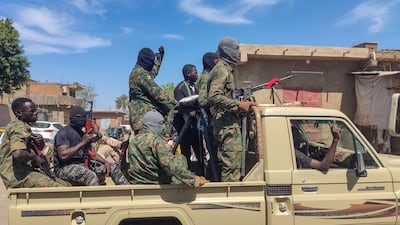As global attention remains fixed on the US-induced global trade war, the conflicts in Ukraine and Gaza, and the Red Sea crisis, a dangerous transformation is unfolding in Sudan. Beneath the devastating confrontation between Gen Abdel Fattah Al Burhan’s Sudanese Armed Forces and Gen Mohamed Hamdan Dagalo’s Rapid Support Forces, extremist networks long thought dormant are re-emerging, threatening to reshape the country’s future and further destabilise the broader region.
While the international community views the conflict as a struggle for power between two rival generals, Sudan is rapidly becoming a fertile ground for extremist violence. Groups sidelined after the 2019 uprising that toppled then-president Omar Al Bashir are regaining ground politically and militarily. These actors are no longer operating on the margins; they are positioning themselves to shape the country’s post-war political and military order.
The world cannot afford to overlook Sudan’s slide into extremism. The country sits at a critical geopolitical crossroads, linking North Africa, the Sahel, the Horn of Africa and the Red Sea corridor – an artery vital to global trade and energy flows. Its total collapse offers fertile ground for extremist organisations such as ISIS and Al Qaeda to regroup, find training grounds and expand their reach at a time when the international counterterrorism focus has shifted elsewhere. Left unchecked, the reactivation of these networks could ignite a new front in the global war on terror, one rooted in a state with little institutional resistance.
The cruel irony is that the very forces millions of Sudanese rejected through peaceful protests are returning, not through the ballot, but through the bullet. That uprising, led by a generation raised under religious authoritarianism, demanded a definitive break from the manipulation of Islam for political gains. The war has undone that progress, reopening the door for extremist influence.
As with a number of civil wars, the lines between regular troops and ideological militias have blurred. Formations such as Al Bara Ibn Malik Battalion and Al Bunyan Al Marsous operate under the SAF’s command yet pursue their own radical agendas. Extremist actors, many linked ideologically to the Muslim Brotherhood, have used military alliances and media platforms to re-enter the political scene. By doing this, they have reclaimed a degree of acceptance and visibility after 2019. The SAF’s ambiguous stance – neither fully embracing nor disavowing these forces – has allowed extremist elements to expand their footprint without formal accountability.
Compounding this trend, transnational terrorist groups such as ISIS and Al Qaeda are quietly embedding themselves into the conflict. They see in Sudan a rare opportunity: a state that is collapsing, porous borders and a vacuum of governance. These groups are not merely seeking recruits; they are laying the groundwork to turn Sudan into a logistical base and ideological battleground. Local extremist figures are indirectly contributing to these efforts by framing the war in transnational and sectarian terms, reinforcing narratives of ideological struggle and national identity exclusion.
Others, some previously imprisoned or discredited, are now manoeuvring to recapture power. Former regime loyalists have been released from prison, re-activated within military circles and even seen publicly aligning themselves with the SAF. Their rhetoric is back on state-linked media. Their networks are rebuilding. And their endgame is clear: re-establishing a state that fuses political power with ideological control.
Alongside their growing battlefield presence, Sudanese extremists are waging an ideological campaign that reframes the conflict through a transnational extremist lens. They are crafting a future narrative that casts Sudan not as a country in civil war, but as a frontline in a broader struggle between political Islam and its perceived enemies – both at home and abroad.
Part of this strategy involves monopolising nationalist legitimacy, presenting themselves as the only actors qualified to speak on behalf of Sudan. To prepare the ground for future political exclusion, extremist factions are actively redefining patriotism in militarised terms. By equating loyalty to the nation with participation in the extremist-aligned war effort, they are pre-emptively delegitimising civilian actors.
This narrative dominance is sustained by a vast propaganda apparatus, including well-funded media outlets, newspapers and digital platforms. With opposing voices weakened, the ideological space is increasingly controlled by those advancing a narrow, exclusionary vision of Sudan’s future.
At the same time, extremist messaging is transnational in scope. It seeks to demonise moderate Arab states, fuelling resentment and justifying future hostilities; agitate ethnic tensions, particularly between Arab and African communities; and position Sudan as part of a wider religious war, drawing in sympathisers from across the region. This framework is not just rhetorical – it is strategic.
The return of these forces is not just a Sudanese problem but also a warning to the international community. If extremists consolidate control over state institutions, they will gain the infrastructure and legitimacy to spread radical ideologies across borders, further destabilising an already fragile region.




